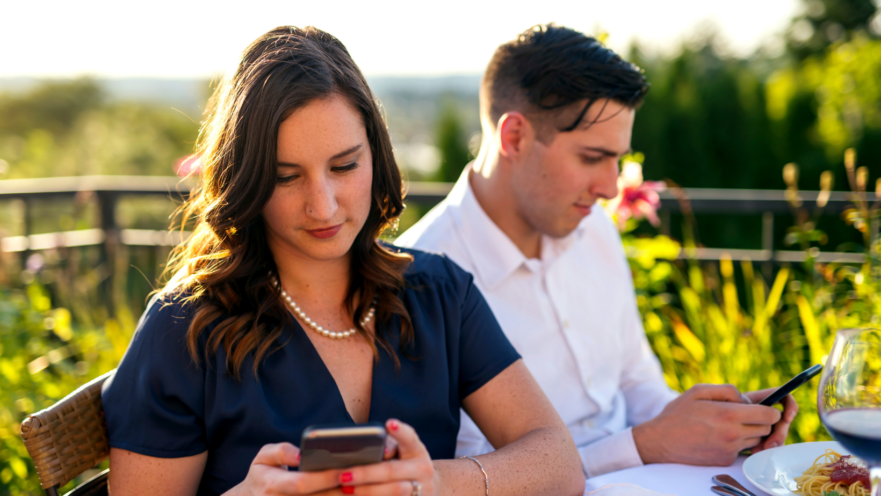“What is phubbing?” you ask.
Great question. Hold that thought.
Now picture this. You are enjoying coffee with a friend and having a great conversation. Then you hear buzzing. And without saying a word your friend glances at their phone. Their expression changes and maybe they mumble “just a minute” and quickly type a text message.
Then your friend sighs, looks back at you and says, “I’m sorry. Where were we?”
So you try to pick up the conversation. But the energy is a little different.
Then a few minutes later, the same buzzing. And the scenario is repeated. The break is a bit longer this time.
You sip your coffee and look around. When your friend stops texting you say something like, “I hope everything is all right.”
“Oh yeah it’s nothing,” they respond.
Ouch. You have been phubbed.
Some history.
Way back in 2012, an advertising agency and a publishing group in Australia gathered some language experts to discuss a certain phenomenon common among smartphone users. They came up with the name.
Phubbing: The act of snubbing someone in a social setting by looking at your phone instead of paying attention.
And now.
If you believe the statistics, 275 million Americans use some version of a smart phone. Research shows the average American checks his or her phone as often as every six minutes. That’s 150 times a day!
But all those buzzing noises, chimes, or other notification signals can really challenge our ability to pay attention to the people around us.
“A notification is an interruption or a distraction,” says Alex Haselberger, a productivity and time management coach. Simply put, it breaks your concentration, and affects your brain for much longer than the few seconds it takes to type that text.
Dr. Catherine Jackson is a licensed psychologist and board-certified neurotherapist. She explains that a simple notification on your phone can cause a rise in cortisol levels in the brain. So it’s not uncommon to feel slightly agitated when your phone buzzes.
In fact, she says, “people who constantly check their alerts have higher stress levels.”
Does phubbing have a negative affect on relationships?
Absolutely.
According to a study conducted by Baylor University’s Hankamer School of Business, 46% of participants said they had experienced phubbing from their significant other. For half of those who reported being phubbed, this created conflict in the relationship.
“Competing with an electronic device is not easy. The addictive powers make it impossible at times.”
That’s what Lori Whatley, a licensed marriage and family therapist working in Atlanta, says about phubbing. She notes that marriage partners can feel undervalued when they have to compete with a cell phone for their spouse’s attention.
And Texas-based marriage and family therapist Jim Seibold, Ph.D. says this is especially true when one spouse places high value on the quality of time spent together.
“When someone’s primary love language is quality time, they will feel rejected and abandoned when their partner is spending too much time on their phone,” according to Seibold.
Some possible solutions.
There are lots of ways to make sure you are the boss of your phone, and not the other way around. Here are a few ideas to help you and your spouse stay in control of your time and attention so you don’t inadvertantly rob your relationship.
- Agree on phone-free times each day. Every couple needs at least a few minutes of time alone each day free of distractions to reconnect and talk. Figure out what works best for you.
- Designate phone free zones in your home. The dinner table is one possibility. Some families put cell phones in a basket or other designated spot while they enjoy dinner together. The bedroom may be another good choice for a phone free zone. Some couples choose to recharge their phones at night in another room to protect time alone together. (Alarm clocks aren’t expensive.)
- Take periodic breaks from social media. If you are spending the day together, agree that you won’t engage with Facebook or Twitter or whatever during that time.
- Do a little research. The data in your phone will tell you how much time you spend on your phone. If your amount of screen time seems excessive, you and your spouse may want to discuss changes.
- Consider disabling notifications for social media apps. Calendar a certain amount of time each day to check your preferred platforms, and stick to your limits.
- Try a social media fast for a week or more to reorder priorities.
- Change your display mode to black and white. Your phone will be less attractive and you won’t be as easily mesmerized by your screen.
“But what if I really need to check my texts because…”
If you want to build better communication skills in your marriage, check out a Dynamic Marriage or United course. And if your marriage is suffering from broken trust because of inappropriate or perhaps secretive phone habits, consider participating in a three-day marriage workshop and learn how to repair and rebuild your relationship with your spouse.

